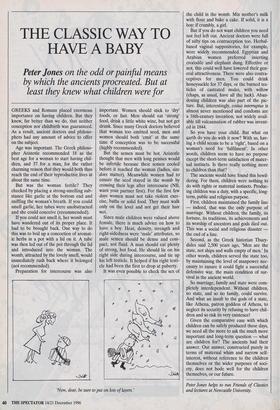THE CLASSIC WAY TO HAVE A BABY
Peter Jones on the odd or painful means
by which the ancients procreated. But at least they knew what children were for
GREEKS and Romans placed enormous importance on having children. But they knew, far better than we do, that neither conception nor childbirth was guaranteed. As a result, ancient doctors and philoso- phers had any amount of advice to offer on the subject.
Age was important. The Greek philoso- pher Aristotle recommended 18 as the best age for a woman to start having chil- dren, and 37 for a man, for the rather charming reason that they would both thus reach the end of their reproductive lives at about the same time.
But was the woman fertile? They checked by placing a strong-smelling sub- stance like garlic at the bottom end and sniffing the woman's breath. If you could smell garlic, her tubes were unobstructed and she could conceive (recommended).
If you could not smell it, her womb must have wandered out of its proper place. It had to be brought back. One way to do this was to boil up a concoction of aromat- ic herbs in a pot with a lid on it. A tube was then led out of the pot through the lid and introduced into the woman. The womb, attracted by the lovely smell, would immediately rush back where it belonged (not recommended).
Preparation for intercourse was also important. Women should stick to 'dry' foods, or fast. Men should eat 'strong' food, drink a little white wine, but not get drunk. Since many Greek doctors believed that woman too emitted seed, men and women should both 'emit' at the same time if conception was to be successful (highly recommended).
But the semen must be hot. Aristotle thought that men with long penises would be infertile because their semen cooled before it reached the woman (ladies, size does matter). Meanwhile women had td ensure the seed stayed in the womb by crossing their legs after intercourse (NB, warn your partner first). For the first few days women must not take violent exer- cise, baths or solid food. They must walk only on the level and not get their hair wet.
Since male children were valued above female, there is much advice on how to have a boy. Heat, density, strength and right-sidedness were 'male' attributes, so male semen should be dense and com- pact, not fluid. A man should eat plenty of strong, hot food. He should lie on his right side during intercourse, and tie up his left testicle. It helped if his right testi- cle had been the first to drop at puberty.
It was even possible to check the sex of 'Now, dear, be sure to put on lots of layers.' the child in the womb. Mix mother's milk with flour and bake a cake. If solid, it is a boy; if crumbly, a girl.
But if you do not want children you need not feel left out. Ancient doctors were full of nifty tips on contraception too. Herbal- based vaginal suppositories, for example, were widely recommended. Egyptian and Arabian women preferred inserting crocodile and elephant dung. Effective or not, this could well have lowered their gen- eral attractiveness. There were also contra- ceptives for men. You could drink honeysuckle for 37 days, or the burned tes- ticles of castrated mules, with willow (chaps, as usual, have all the luck). Aban- doning children was also part of the pic- ture. But, interestingly, coitus interruptus is almost never mentioned and condoms are a 16th-century invention, not widely avail- able till vulcanisation of rubber was invent- ed in 1844.
So you have your child. But what on eArth do you do with it now? With us, hav- ing 'a child seems to be a 'right', based on a woman's need for 'fulfilment'. In other words, children seem to have no purpose except the short-term satisfaction of mater- nal instincts. Is there really nothing more to children than that?
The ancients would have found this bewil- dering. For them, children were nothing to do with rights or maternal instincts. Produc- ing children was a duty, with a specific, long- term, public and religious purpose.
First, children maintained the family line — indeed, that was the only purpose of marriage. Without children, the family, its fortune, its traditions, its achievements and its worship of ancestors and gods died out. This was a social and religious disaster — the end of a line.
Second, as the Greek historian Thucy- dides said 2,500 years ago, 'Men are the state, not ships and walls empty of men.' In other words, children served the state too, by maintaining the level of manpower nec- essary to ensure it could fight a successful defensive war, the main condition of sur- vival in the ancient world.
So marriage, family and state were com- pletely interdependent. Without children, no state, and so no family, could survive. And what an insult to the gods of a state, like Athena, patron goddess of Athens, to neglect its security by refusing to have chil- dren and so risk its very existence!
Given the comparative ease with which children can be safely produced these days, we need all the more to ask the much more important and long-term question — what are children for? The ancients had their answer. Our answer, constructed purely in terms of maternal whim and narrow self- interest, without reference to the children themselves or the wider purposes of soci- ety, does not bode well for the children themselves, or our future.
Peter Jones helps to run Friends of Classics and lectures at Newcastle University.


















































































































 Previous page
Previous page